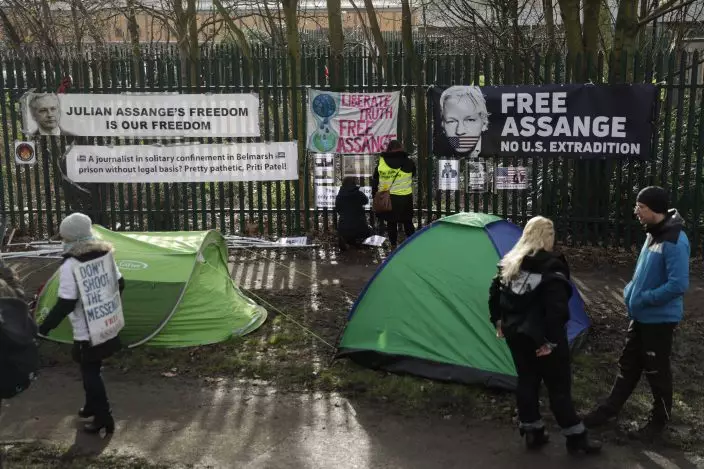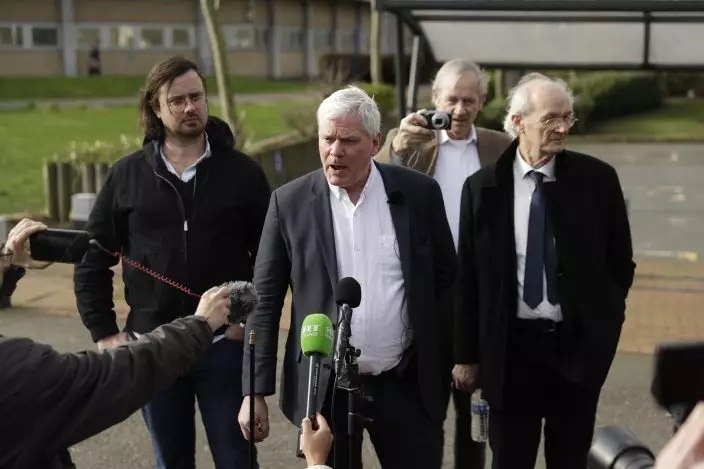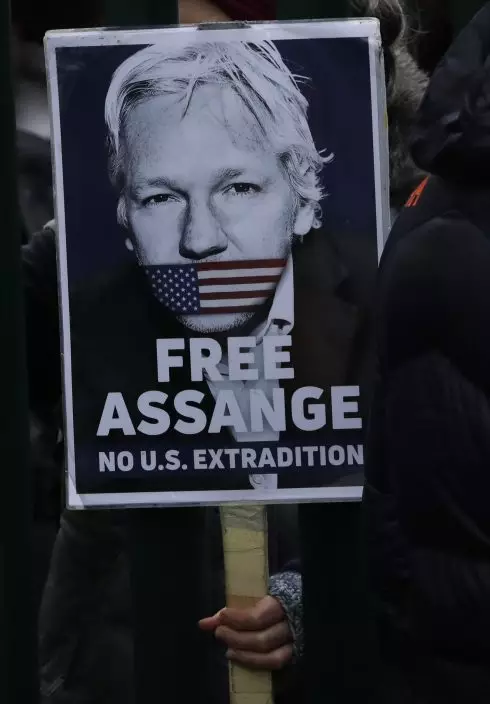A lawyer for Julian Assange argued Wednesday that the WikiLeaks founder should not be sent to the United States because a U.K.-U.S. treaty bans extradition for political offenses.
Assange, 48, is wanted in the U.S. on spying charges over the leaking of classified government documents a decade ago. American prosecutors accuse Assange of conspiring with U.S. Army intelligence analyst Chelsea Manning to crack a password, hack into a Pentagon computer and release hundreds of thousands of secret diplomatic cables and military files on the wars in Iraq and Afghanistan.
He faces 18 charges of espionage and computer misuse, and faces a maximum sentence of 175 years in prison if convicted.

Supporters of Julian Assange tape up protest messages on a fence by supporters' tents on the second day of a week of opening arguments for the extradition of Wikileaks founder Julian Assange outside Belmarsh Magistrates' Court in south east London, Tuesday, Feb. 25, 2020. U.S. authorities, want to try Assange on espionage charges. A lawyer for the Americans said the Australian computer expert was an “ordinary” criminal whose publication of hundreds of thousands of secret military documents put many people at risk of torture and death. (AP PhotoMatt Dunham)
Assange says he was acting as a journalist entitled to First Amendment protection. His lawyers argue that the U.S. charges are a politically motivated abuse of power.
Assange’s attorney, Edward Fitzgerald, said Wednesday that extradition for political offenses is prohibited under the 2003 U.K.-U.S. Extradition Treaty.
"If it's not a terrorist case, not a violent offense, then the principle you should not be extradited for a political offence is of virtually universal application,” he said in court. “It dates back for more than 100 years.

The Editor-in-chief of WikiLeaks, Kristinn Hrafnssonon, centre, from Iceland, speaks to the media flanked by Julian Assange's father John Shipton, right, and half-brother Gabriel Shipton, left, on the second day of a week of opening arguments for the extradition of WikiLeaks founder Julian Assange outside Belmarsh Magistrates' Court in south east London, Tuesday, Feb. 25, 2020. U.S. authorities, want to try Assange on espionage charges. A lawyer for the Americans said the Australian computer expert was an “ordinary” criminal whose publication of hundreds of thousands of secret military documents put many people at risk of torture and death. Assange's lawyer countered that the WikiLeaks publisher was being victimized by a “lawless” American government that wanted to make an example of him. The judge isn't expected to rule until several months after that, with the losing side likely to appeal. (AP PhotoMatt Dunham)
"The U.S., of course, writes it into every treaty because they don't want their citizens being extradited for political offenses."
U.S. authorities deny Assange is being prosecuted for political offenses. James Lewis, a lawyer for the U.S. government, said in court Monday that Assange was an “ordinary” criminal who had put lives at risk by publishing uncensored secret documents.
Assange has complained of struggling to hear and concentrate during the extradition hearing, which is being held at London’s high-security Woolwich Crown Court.

A supporter hold a placard which reads 'Free Assange' as she protests against the extradition of Wikileaks founder Julian Assange outside Belmarsh Magistrates Court in London, Monday, Feb. 24, 2020. The U.S. government and WikiLeaks founder Julian Assange will face off Monday in a high-security London courthouse, a decade after WikiLeaks infuriated American officials by publishing a trove of classified military documents. (AP PhotoMatt Dunham)
Assange has been in Belmarsh Prison, next to the court, since April 2019, when he was evicted from the Ecuadorian Embassy in London. He jumped bail and took refuge in the embassy seven years earlier to avoid being sent to Sweden over allegations of rape and sexual assault.
Assange said Wednesday that he was not able fully to participate in the proceedings.
"I can't speak to my lawyers in confidentiality,” he told District Judge Vanessa Baraitser. “There's a whole series of people sitting there and there's microphones.
"I have very little time with my lawyers ... the other parties must have something like 100 times more contact a day," Assange said. "There's no point concentrating on anything as I'm not able to participate."
Fitzgerald asked whether Assange could be allowed to leave the glass-enclosed dock and sit with his lawyers.
The judge said the decision was not up to her.
"I strongly suspect security officials wouldn't be able to accommodate that,” she said.
The extradition hearing is expected to continue for the rest of the week, then take a break before resuming in May.


